Savvy Business Leader
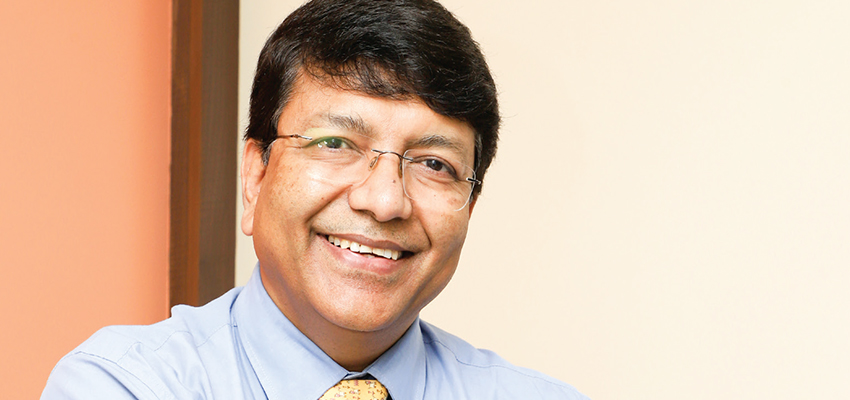
An electronics and telecom engineer, and Masters in Management Sciences with Ph.D. in International Marketing Strategies, Dr. Ravindra Utgikar, has over 29 years of global experience in sales, marketing, business development, formulating and implementing Go-To-Market and business strategies. Currently in the role of Vice President - Corporate Strategy, Praj Industries Ltd, his field of expertise include product management, mergers and acquisitions, partnerships and alliances, digital marketing, brand management, new product development, to name a few. He emphasises on entrepreneurial thinking coupled with positive attitude and energy, which he says has helped him to acquire new skills and knowledge as per business demands. In an exclusive interview with Corporate Citizen, Dr Ravindra Utgikar, talks on his career journey, his strong work ethics, human relationship management, bioeconomy space and more
"Leaders with an entrepreneurial mindset create value by recognising and acting on opportunities, making quick informed decisions with available information instead of analysis paralysis. They remain adaptable in uncertain environment and as eternal optimist they see problems as potential opportunitie"
Corporate Citizen: Walk us through your 33+ years career journey from a Sales and Servicing Engineer (in 1989) to currently leading a company as its VP-Corporate Strategy? What were the pivotal moments that shaped your career path?
Ravindra Utgikar: It has been absolutely an exhilarating journey over past three decades, where I got to work in projects as well as project businesses in India and overseas. I had deep exposure to intricacies of customer facing roles e.g. Sales, Marketing, Business Development, General Management, Corporate Strategy, Communication, and Investor Relations among others. Having travelled in over 40 countries across all five continents—conceiving, formulating, and implementing business strategies, gave me incredible experience of harnessing cultural diversities, geopolitical considerations and how micro-economic environment plays a critical role in overall success of an organisation.
At the very beginning of my career, I experienced Y-point—an opportunity to work in Singapore and UAE or pursue my post-graduation in the USA. Going by the adage of A bird in the hand is worth two in the bush, I opted for former and in hindsight I saw that as a tipping point for my future international career.
I believe, opportunity to work very closely with legendary industry icon, Dr. Pramod Chaudhari, Founder Chairman, Praj, has had profound influence on my career progression and overall development. His uncanny ability to see ahead of the curve, exemplary business acumen, eternal optimism and unwavering commitment to sustainable development of society, has a rub-off effect on me. I enjoyed immense empowerment and trust, while closely working with late Mr. Tulsi Tanti, Founder Chairman, Suzlon Energy—to fulfil companies’ global expansion plans had a big impact on my evolution as global leader. In 2003, I was deputed to US to set-up North America business, and working with US colleagues from different function was a great learning experience about global best industry practices—that matured me as a professional.
Another defining phase in my career was opportunity to work in Tata Group upon my return to India, following my three years stint in Middle East and Singapore. Here I gained deeper understanding of systems, processes and policies. This laid a strong foundation for pursuit of business excellence without compromising values, governance and ethics.
CC: Continuous learning is essential in such a rapidly evolving field. How do you stay updated with the latest research and incorporate it into your work?
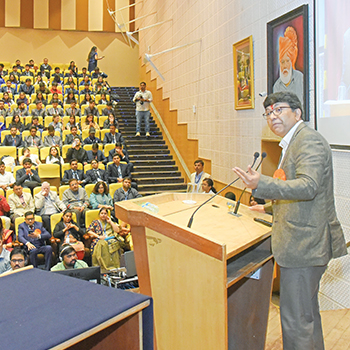
With unlearning and relearning—upskilling isn’t matter of choice but an obligation for professionals to excel. Pursuing post-graduation and doctoral programme in management while holding senior management positions, has immensely helped me to apply textbook knowledge at work with great results. I also pursued several advanced management programmes, e.g. Global Account Management at the University of St. Gallen in Switzerland, Center for Creative Leadership in the USA, The Indian school of Business (ISB) Hyderabad etc. I could get abreast of contemporary topics and trends but importantly interactions with global peer group were hugely beneficial. And then, there is always informal learning at various industry and academia forums by meeting diverse set of people and exchange of thoughts.
I am very fond of reading—in addition to business dailies, I have subscriptions of The Economist and Harvard Business Review, to keep me updated on latest happenings. Since past few years listening to podcasts of global thought leaders such as Simon Sinek, Adam Grant, Yuval Noah Harari among others, is a routine during my travel and daily office commute. TED talks is yet another invaluable source of knowledge and helps me keep up with major developments in the world on various fronts. I have a conviction that ‘Books are man’s unfailing friends’ and although of late I don’t read as much as I would like, still there’s always a book on my table.
As a part of my work, I closely follow and study latest reports released by major international agencies i.e. World Economic Forum (WEF), International Energy Agency (IEA), United Nations Environment Programme (UNEP), just to name a few. From the intelligence and insights derived from these reports, we make necessary tweaks in our strategies and business plans.
Reinforcement of fundamental concepts, application-based learning, research-based decision-making, are amongst the numerous learnings that I can recount. These have kept me in good stead thus far.
CC: You graduated with BE in Electronics & Telecom along with a Masters in Management Sciences. Is this growing trend of combining tech engineering and management education really helping students with better opportunities?
I think so. Since the beginning of millennium, we have witnessed technological disruptions reconfiguring the business landscape across all industry sectors, thanks to the advent of the internet and deeper penetration of mobile services. Also, progressive policies of Government, in the past decade have ensured that there is surge in tech startup culture. A rising number of budding techno-entrepreneurs wish to improve their business skills using formal management programmes.
We are also aware that with rising purchase power parity, India is among the most promising markets and several tech multinationals want a bigger share of the pie. Given our cultural diversity and complexity as a nation, they prefer local leaders drive domestic business growth.
All these developments are driving the need for professionals with business acumen and formal training across the value chain, to manage and grow business. This market need is fueling the trend of more and more engineering graduates pursuing management education. While all this is true, I must mention huge traction and opportunity for well qualified technocrats to stay ahead in the research and innovation race.
CC: What AI can and can’t do, and what that means for marketers and marketing strategies?
Artificial Intelligence can do just about anything and everything—the way technology is evolving at an astonishing pace. There is a general belief that machines lack human qualities such as idea generation, intuition, emotions, common sense, and cultural sensitivity. However, at the current nascent stage, artificial intelligence and machine learning (AI & ML) prototypes have shown promise and potential to overcome these limitations, much earlier than we envisage. This calls for dire need to regulate these technologies by way of institutionalising public policies that ensure rightful usage in the interest of mankind and prevent its evil impact. Such public policies need to be nimble i.e. they evolve alongside technology and importantly their implementation mechanism must be very stringent.
Undoubtedly, AI has proven to be a powerful tool in various industries and applications such as data analysis, automation and decision-making. AI uses customer data, historical data, machine learning, and other computational data to predict what a prospective customer would do almost on real-time basis. This helps marketers make informed and smart decisions.
To start with marketers must be conversant with AI & ML technology capabilities and as a next step they must master skills to effectively deploy applications. Typically, AI & ML is very effective means to secure business research in terms of customers, competition, technology, and policies. Insights derived from this intelligence must be converted into strategies and in turn into timebound actions list with responsibilities and timeframe clearly defined. Critical self-assessment and analysis of organisation capabilities will lead to defining pathways as to which job are best left to machines, e.g. 24x7 service using Regenerative AI chatbot, and which needs to be handled by experts for example customer relationships and finalisation negotiations.
Marketers must also be very cognisant of underpinned issues of data security while deploying Large Learning Model based AI, as these are capable of making or breaking businesses. Marketers must put in place AI guardrails to help ensure regulatory compliance, brand reputation and ethical AI usage, by mitigating biases, providing verification systems, and ensuring alignment with organisation’s values. Using digital twins, marketers can create virtual representations of customers and gain the power to simulate behaviours, predict preferences, and enhance engagement strategies. Digital twins offer a transformative approach to markets that can revolutionise customer insights, journey optimisation and personalised experiences.
"Reinforcement of fundamental concepts, application based learning, research-based decision-making are amongst the numerous learnings that I can recount. These have kept me in good stead thus far"
CC: In a global business scenario, the challenge of expanding into new markets is often a formidable one, requiring strategic insight, adaptability, and innovative thinking—and there is no one-size-fits-all strategy. You have a Ph. D. in International Marketing Strategies, what has been central to your research in this field?

Indeed, global business forays and growth is far too complex that one can imagine. I think few important aspects very central to success include - harnessing cultural diversities in win- win proposition, constantly innovating to create value for global customers, as perceived by them of course, and lifecycle support of the proposed solutions using horses-for-courses approach, among other things.
Numerous considerations such as geopolitical environment, especially inter-governmental relations, foreign currency nuances, global mandates, complicated risk assessment e.g. legal redressal, people management and governance practices, are so very distinct from domestic business. It is said that western world is contracts driven whereas eastern world is relationship driven. Typically, global north developed economies being wealthy, offer ease of doing business. Whereas global south mostly developing nations have resources crunch and so one has to be extra careful there.
My research also reveals that collaboration and partnership is the best way to succeed. Such alliance must be based on foundation of mutual respect, trust and shared long term vision. Synergies can be derived from complementing strengths between organisations.
CC: What actually is an entrepreneurial mindset? For a country like India which is embracing entrepreneurship education, what is your articulation of an entrepreneurial mindset?
First, let’s appreciate that at 1.42 bn India is the most populous nation, having largest working class with a median age of around 28 years. There is a dire need to create value added employment to secure demographic dividend. This means we need job givers, not just job seekers and that’s why role of entrepreneurs is gaining unprecedented importance. Entrepreneurship sparks innovation, drives employment, fuels economies, and offers solutions to a range of environmental and societal challenges.
At the heart of entrepreneurs is a strong mindset of resilience, resourcefulness, risk- taking and solutions-orientation, even when the conditions are unfavourable, at times. People with these mindsets are lifelong knowledge- seekers who are curious and creative, and they are critical thinkers. Leaders with an entrepreneurial mindset create value by recognising and acting on opportunities, making quick informed decisions with available information instead of analysis paralysis. They remain adaptable in uncertain environment and as eternal optimist they see problems as potential opportunities. Extraordinary journey of first generation technopreneur, Dr. Pramod Chaudhari, in steering Praj as India’s best known industrial Biotech company in the world, is an excellent testament of entrepreneurial mindset.
Stemming from strong conviction of founder chairman, Dr. Pramod Chaudhari at Praj, we actively practice intrapreneurship. Backed by a company's available resources, intrapreneurs develop open-ended ideas and turn them into real-world products and services. Finally, entrepreneurial mindset is needed just about everywhere throughout our society, not just in business, but also in government, NGOs, academic institutions and corporations.
CC: What do you believe are the essential skills should management freshers possess to excel in their careers—helpful resources and trends that will help them navigate the future?
We are indeed living in the VUCA (volatility, uncertainty, complexity and ambiguity) world, an acronym first used in the U.S. Army War College in 1987. It seems very likely that VUCA is here to stay. So conventional knowledge, wisdom and methods of problem solving may not be very relevant and sufficient. Therefore, to be able to not just survive but thrive, continuous learning, upskilling, reskilling and multi-skilling, has to be a way of life.
While undoubtedly, learning new skills is crucial for personal and professional growth, there remains conundrum to decide what and how to learn. In an increasingly digital world, skills like digital marketing, search engine optimisation, social media, graphic design, web development etc., will come very handy for freshers for securing meaningful work.
We are aware that we are fighting a losing battle, as machines can now think logically and conduct routine tasks. This is where creative and critical thinking skills will become paramount to ensure longevity at work. Design thinking has fast emerged as a hot prospect with applications across industry segments. To create unique products, services and business models, using creative problem-solving that is focused on experimentation and collaboration, will keep budding managers in good stead. Yet another important skill area is that of global orientation, given rising interdependencies for materials, technologies, services etc.
Now, where to get these essential skills? Well, students must leverage online learning platforms. Most companies offer training for capacity building to achieve goals. They can avail benefits of career development during employment. Additionally, they need to develop and leverage mentors and coaching programmes, for upskilling and gaining insights into new-age career paths. Finally, most business schools today through industry participation, offer various skill upgrade/bridge programmes that has industry oriented curriculum.
Understanding customer’s stated and unstated needs of today and tomorrow is the bedrock of business success. Equally important is to formulate, communicate and implement to address customer pain areas and help them win in the market place. So management graduates must cultivate customer centricity and stay committed to delivering superior customer experience in every single interaction across lifecycle.
"My research reveals that collaboration and partnership is the best way to succeed. Such alliance must be based on foundation of mutual respect, trust and shared long term vision. Synergies can be derived from complementing strengths between organisations"
CC: What is your success mantra and the learning you gained throughout your life?
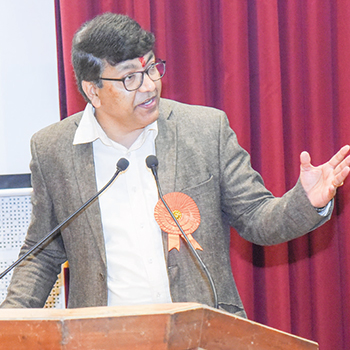
One needs to surround himself/herself with the dreamers and the doers, the believers, and thinkers. We are greatly influenced, whether we like it or not, by those closest to us as it affects our way of thinking, our self-esteem, and our decisions. What motivational speaker Jim Rohn famously said is so true – ‘We are the average of the five people we spend the most time with’. Throughout my career, I have been very fortunate to associate with some really accomplished individuals — siblings, friends, colleagues, bosses, mentors and even subordinates. I owe my success to them. Learning is that we need to choose our company wisely.
Continuous improvement by challenging status quo is only way to stay ahead of the curve. I truly believe and try to practice Thomas Edison’s famous quote- ‘There’s a better way to do it. Find it.’ I think objectivity to work by bringing tangible metrics like time, cost of quality, quantity and risk, helps develop sharp business acumen.
Mid-stage of my career I worked closely with Boston Consulting Group, on important business transformation projects. I got immensely benefited from it and few invaluable lessons that have stayed with me include – outcome driven (not output driven), orientation, structured approach to problem solving, process centric methodology, documentation, alignment with all stakeholders and above all ‘Failing to plan is planning to fail’.
People skills are so very important. Your ability to build a network of authentic personal and professional relationships, not your financial capital, is the most important asset in your portfolio.
CC: What is India’s standing in the Bioeconomy space? To facilitate energy transition, what needs to be done so that India emerges as a powerhouse of bioenergy? What progressive efforts are we taking to leverage our captive biological resources for production of biofuels?
Indeed, as an agrarian economy Indian bioeconomy holds immense potential that needs to be fully exploited. We must leverage our captive agri-resources to produce biobased products i.e. Biofuels and Biochemicals. Biofuels are low carbon renewable transportation fuels, derived from bio based resources that help sustainable decarbonisation of hard to abate transportation sector. Biochemicals are environmentally friendly alternatives to traditional chemicals. Produced from agri-based feedstocks, biochemicals work on closed loop carbon cycle principle and thus aid carbon recycling. Propagating bioenergy accelerates India’s energy transition, achievement of nationally determined contributions enroute to fulfillment of Net-Zero target by 2070. Bioeconomy functions as social, economic, environmental and energy enabler for sustainable of growth a nation.
India is already one of global leaders in bioeconomy on the back of ample availability of biobased feedstock, homegrown technology, progressive policy and robust industry ecosystem. According to BIRAC report India’s Bioeconomy reached a substantial value of $137.24 billion in 2022. The Bioeconomy in India is forecasted to report Compound Annual Growth Rate (CAGR) of 12%, indicating a potential expansion to $330.7 billion, in an optimistic scenario. Thus Bioeconomy is poised to play an important role in Amrut Kaal, helping India become 3rd largest economy before the end of current decade and ultimately make India 'Vikasit Bharat' by 2047.
There are several new frontiers in Bioeconomy that are being explored. Sustainable Aviation fuel that blends with aviation jet fuel, helps curb GHG emissions in the aviation sector. Compressed Biogas (CBG) that is produced from a variety of bio feedstock e.g. biomass, is a classic example of ‘waste to wealth’ and it blends with Compressed Natural gas (CNG). Thus, it assists in reducing import dependency of Liquid Natural gas (LNG). The Union Budget 2024-25 has given thrust to Biomanufacturing specifically biopolymers, bioplastics, biopharmaceuticals and bio-agri inputs. This will bolster rural economy as farmers can avail additional revenue stream by selling agricultural waste as feedstock for biomanufacturing as a part of Make in India and Atmanirbhar Bharat.
CC: India is still far from finding solutions to decarbonise its transportation sector to curb Greenhouse Gas (GHG) emissions. It is a crisis, but on the other hand mobility is fundamental in supporting economic growth, creating jobs, connecting people to essential services and its growth cannot be restricted. So, how can bio mobility solutions and actions ensure sustainable and inclusive growth?
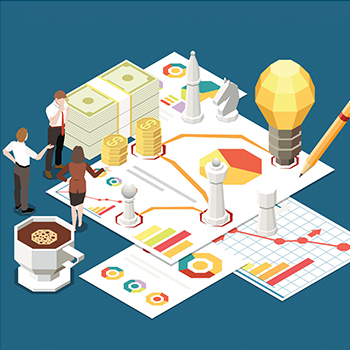
Bio-mobility solutions offer a promising pathway to address the dual challenge of decarbonising transportation, while supporting economic growth and inclusivity in India. Here's how:
Biofuels for Transportation: Encouraging the adoption of biofuels such as biodiesel, bioethanol and biogas, can significantly reduce carbon emissions from vehicles. These fuels can be derived from renewable sources such as agricultural residues, organic waste and dedicated energy crops. India has abundant agricultural resources that can be utilised for biofuel production, which can create jobs in rural areas and support the livelihoods of farmers.
Promotion of Electric and Hybrid Vehicles: While biofuels can help reduce emissions from conventional vehicles, transitioning to electric and hybrid vehicles powered by renewable energy sources can further accelerate decarbonisation efforts. Incentivising the production and adoption of electric and hybrid vehicles, along with developing the necessary infrastructure such as charging stations, can drive sustainable growth in the transportation sector.
Investment in Research and Development: Continued investment in research and development is crucial for advancing bio-mobility technologies and making them more efficient and cost-effective. This includes research into advanced biofuels, bioenergy production processes, and innovative transportation solutions such as bio-based materials for vehicle construction.
Policy Support and Regulatory Framework: Governments play a key role in driving the transition towards sustainable mobility through supportive policies and regulations. This includes setting ambitious targets for renewable energy use in transportation, providing subsidies and tax incentives for biofuel production and consumption, and implementing fuel efficiency standards for vehicles.
Integration with Public Transportation: Bio-mobility solutions should be integrated into public transportation systems to ensure accessibility and affordability for all segments of society. This can involve the use of biofuels in buses, trains, and other forms of public transit, as well as the development of sustainable urban mobility plans that prioritise walking, cycling, and use of public transport.
Capacity Building and Skill Development: To fully realise the potential of bio-mobility solutions, there is a need for capacity building and skill development across the entire value chain – from biofuel production to vehicle manufacturing and maintenance. Training programmes and vocational courses can empower individuals with the skills needed to participate in the growing bio-mobility sector, thus fostering inclusive growth. By embracing bio-mobility solutions and taking concerted actions across multiple fronts, India can achieve both its climate goals and aspirations for sustainable and inclusive economic growth in the transportation sector.
CC: You are passionate about education and have associations with various leading academic institutions. What according to you is future of education?
Yes, I am firm believer of Noble Laureate Nelson Mandela’s famous saying ‘Education is the most powerful weapon, which you can use to change the world.’ I think our robust education system has helped us claim a leadership position certainly of global south and also world economy. India’s recent strides based on indigenous technologies in space, vaccine and industrial biotechnology domain, has left entire world in awe and admiration. To be able to maintain this pole position we need to continually work on imparting high-quality education to our huge talent pool and make them globally competitive.
I believe we are experiencing a radical shift in the education system to experiential learning. It’s not anymore about what teachers want to teach but everything to do with what students want to learn. Today, knowledge is just a click away and what is most important is deep understanding and application. I am happy that our National Education Policy 2020, has mandated closer collaboration between industry and academia, on various fronts including research and innovation. These are times of multidisciplinary approach to technology development and commercialisation of solutions that help address world’s most important issues such as climate change and sustainable development. This is helping blur and eventually vanish divisive lines between industry and institutions, just the way we observe in the developed world. I believe the time has come that overall student experience must be the number one priority of academics just like customer experience is, in business world.
"To be able to not just survive but thrive, continuous learning, upskilling, reskilling, and multi-skilling has to be a way of life"
CC: The imbalance between People, Profit, and the Planet is causing series harm. How can the concept of Industry 5.0 be mooted to resolve some of these serious issues, when it comes with its own set of challenges?
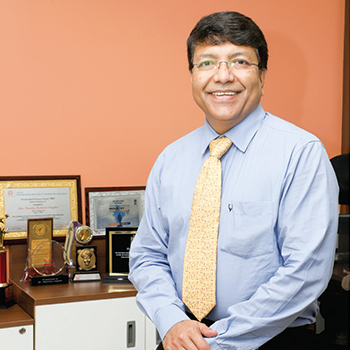
Undoubtedly every single industrial revolution from advent of steam engines (IR 1.0, 1784) to assembly line mass production (IR 2.0, 1870) and then from automation based on advancements in Computer IT & Electronics (IR 3.0, 1969) to Smart connected factories using IT and software solutions (IR 4.0, 2010) has brought prosperity and progress. It has helped alleviate poverty, improve quality of life, enhanced productivity and economic growth. However, every past industry revolution has brought with it set of challenges.
In pursuit of GDP growth led by industry and infrastructure development, we have been mindlessly consuming energy, which is mostly derived from fossil resources. In the process we have been causing irrevocable damage to planet earth and the environment. Scientific studies reveal that exponentially rising GHG emissions attributable to human activities, is one of the major causes of global warming and climate change that is jeopardising the very existence of mankind. Also, machines taking over human jobs, especially due to enhanced productivity, scalability and quality, is giving rise to rising unemployment and mental issues. Clearly profits are coming at the expense of the planet and people.
The very genesis of Industry 5.0 is to address these daunting challenges. It aims to restore harmony between People-Planet- Profit equation by bringing to fore human centric development and sustainability aspects aligned with sustainable development goals of United Nations. Industry 5.0 promotes co-existence of humans and collaborative-robots, better known as Cobots. It envisages where tactical and repetitive jobs are done by machines whereas strategic and transformative work is left for humans.
In fact, in December 2021, at an IEEE PuneCon 2021 International Conference, along with Dr. Pramod Chaudhari, I co-authored a paper on enhanced version of Industry 5.0. This paper is published in Xplore, the flagship digital platform of IEEE, for discovery and access to scientific and technical content. We have envisaged that alongside Cobots, Bioeconomy is poised to take a center stage to facilitate sustainable development. To meet climate goals industries will drive sustainability agenda by deploying environment friendly biobased products in lieu fossil resources wherever possible to minimise negative impact on environment. At the heart of enhanced version of Industry 5.0, is the very concept of circular economy—keeping materials and products in circulation for as long possible. Circular economy reduces material use, redesigns materials and products to be less resource intensive, and recaptures “waste” as a resource to manufacture new materials and products.
CC: You love and take time off for spending time with your family, or for reading management books, and gardening. How do you make sure and craft time out-of-busy-work for seeking a state of inner Zen?
I came across an interesting concept which underscores that there is nothing like work- life balance. Work has to be an internal part of life. If that’s not the case, then one needs to consciously make necessary adjustments, say in job profile, industry and work that is synergistic to one’s passion. How true it is!
Being in the business of conserving environment I find it immensely fulfilling to drive climate action agenda through work and through my commitment to academia and industry forums. I regularly write leadership columns on edit pages of leading Marathi dailies on the topic of sustainability, climate action, technology innovation among others. The positive responses I receive from bigwigs in society, professional and social network and from totally unknown quarters from time to time, is very gratifying. It gives me energy to strive harder and help attract change champions to drive sustainability agenda.
My daily commutes and occasional travel gives me the opportunity to pause, ponder for any course correction and persist with my mission of making a difference and leaving a legacy.